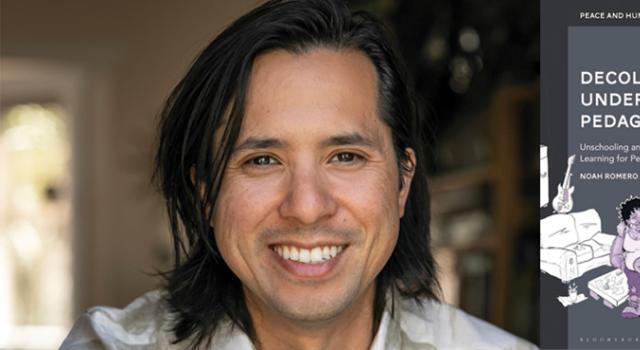
Noah Romero

Noah Romero earned his Ph.D. from Waipapa Taumata Rau (The University of Auckland) in the fields of critical studies in education and Māori, and Indigenous education. Drawing from a transnational constellation of critical, Indigenous, queer, and decolonial ways of knowing and doing, Romero's teaching and research deepens understanding of racialized subjectivity by emphasizing the generative possibilities that occur when Indigenous, immigrant, and dispossessed peoples commune with land, our ancestors, and one another.
Romero's first book, Decolonial Underground Pedagogy: Unschooling and Subcultural Learning for Peace and Human Rights will be published by Bloomsbury in 2024. The book compiles several insider ethnographies that theorize the anti-oppressive pedagogies found in minority-led punk, skateboarding, and unschooling subcultures. Instead of reifying colonial logics like individualism, competition, and consumerism, minority-led subcultures often cultivate community engagement, an understanding of one’s responsibilities, and a shared sense of identity. These findings correlate with experiences of healing and liberation among subcultural insiders with racialized, queer, and nondominant identities, which has significant implications for the development of anti-racist, community-responsive, and decolonial forms of education.
Recent and Upcoming Courses
-
This course offers a survey of critical Indigenous studies-contemporary transnational and transdisciplinary theorymaking from a new and emerging generation of Indigenous scholars. Critical Indigenous studies make crucial interventions in our collective understanding of race, gender, politics, sexuality, identity, democracy, dis/ability, migration, human rights, and multiculturalism. Centering the fact that Indigenous knowledge is dynamic and pertinent to issues of universal existential concern, this course aims to develop a broad and deep appreciation for Indigenous ways of knowing, doing, and relating that facilitate the development of kinship networks and fluidarities that transcend colonial traumas, borders, terrains, and fictions. Keywords:Education, Native American and Indigenous studies, teaching The content of this course deals with issues of race and power.
-
This course is designed to offer a deep overview and practical application of decolonizing pedagogy-an approach to teaching and learning that promotes reciprocity, balance, healing, sustainability, and the inherent sovereignty of Indigenous and dispossessed peoples. Founded on the intersection appreciation of pedagogical work from Indigenous, Black, queer, feminist, trans and person-of-color scholars and practitioners, this course aims to support all students interested in curriculum and instruction in developing a strong practical and theoretical foundation from which to actualize reparative educational processes. Students will explore how community-sustaining, decolonial, and relational teaching practices can enhance student learning while working to redress historical traumas and build solidarities between schools, families, and communities. Education, Native American and Indigenous studies, teaching The content of this course deals with issues of race and power.
-
How has compulsory education been used to perpetuate colonialism and its associated discourses, like racism, cisheteronormativity, white supremacy, anti-Blackness, ableism, and Indigenous dispossession? Conversely, how can radical and ancestral approaches to teaching and learning insurrect subjugated knowledge and unite people in a shared struggle for liberation? This Native American and Indigenous Studies foundation course introduces students to the critical study of education through the historical examination of colonial schooling, as well as Indigenous efforts to reclaim Land+, languages, and lifeways through community-sustaining pedagogy.
-
What do punk rock, heavy metal, skateboarding, hip-hop, and comedy teach us about Indigenous liberation? This course frames subcultural communities led by historically colonized but inherently sovereign people as vital movements for justice, equity, and anti-racism. Bringing Native American and Indigenous Studies in conversation with theories of subcultural sociality, this course aims to foster a deep understanding of how Indigenous and minoritized people agitate for collective rights while dynamically preserving ancestral knowledge.


